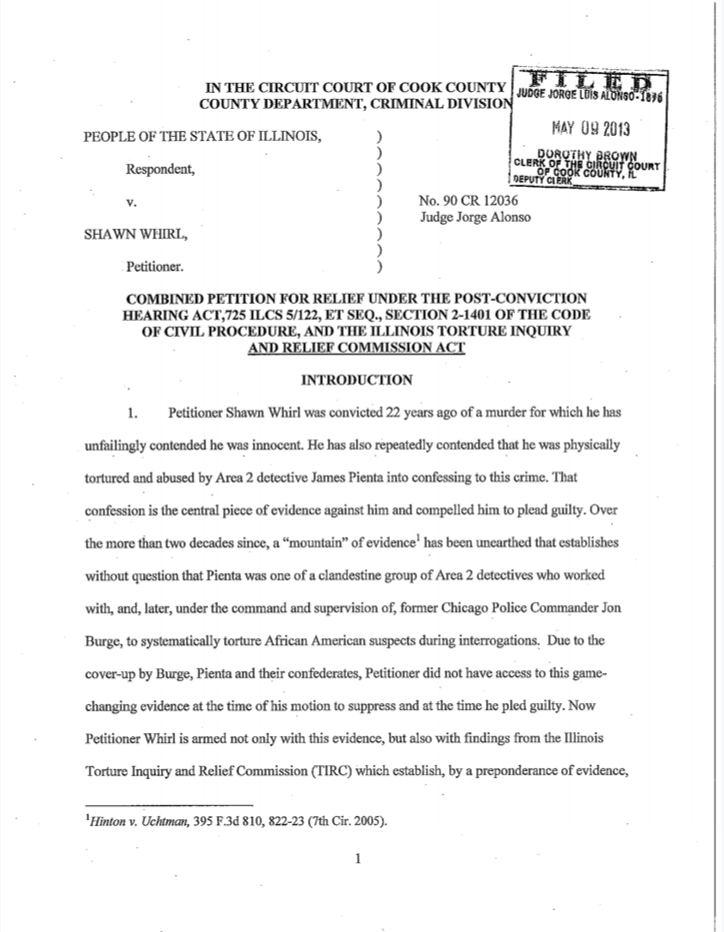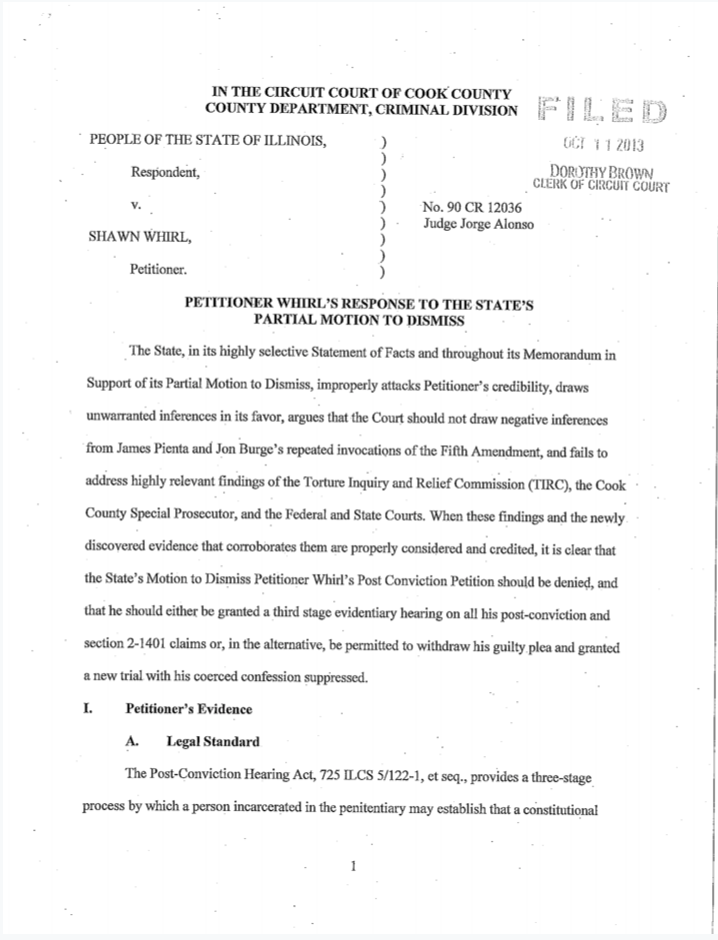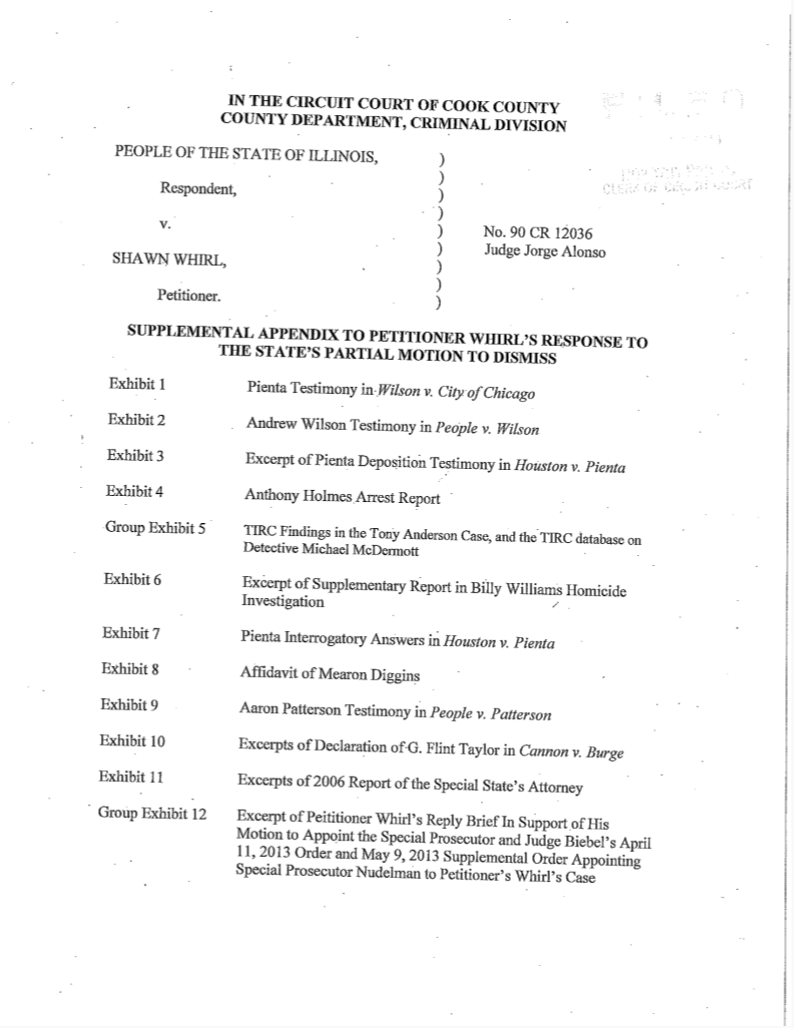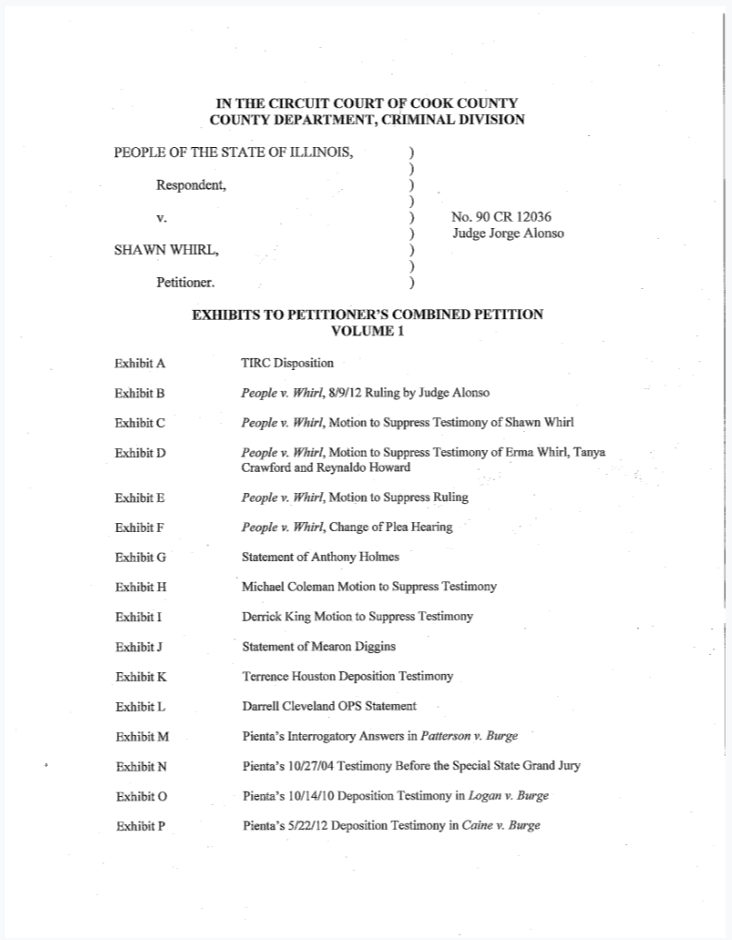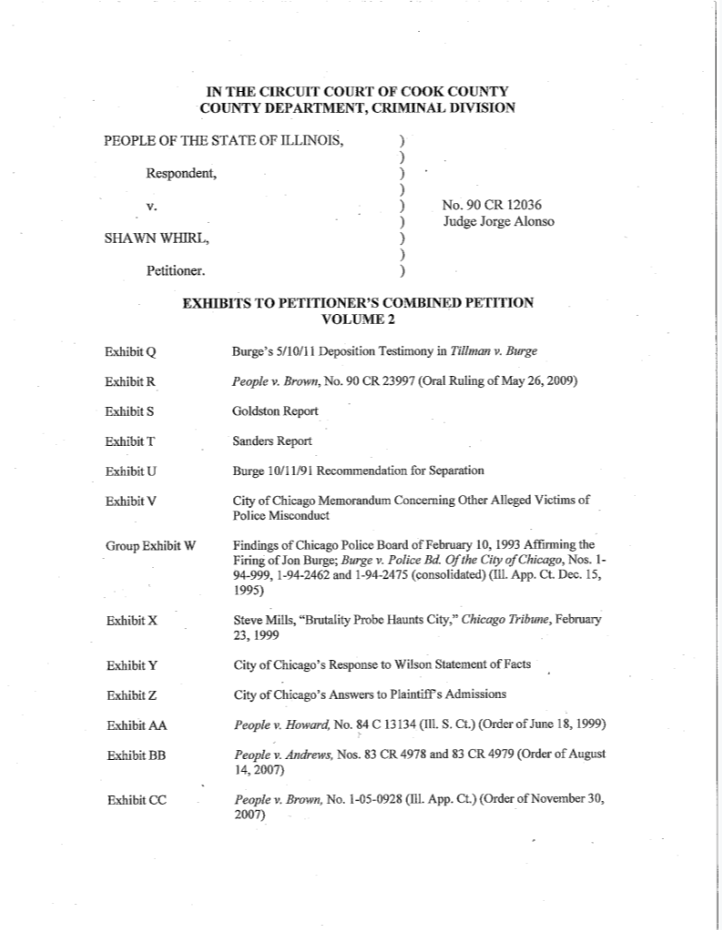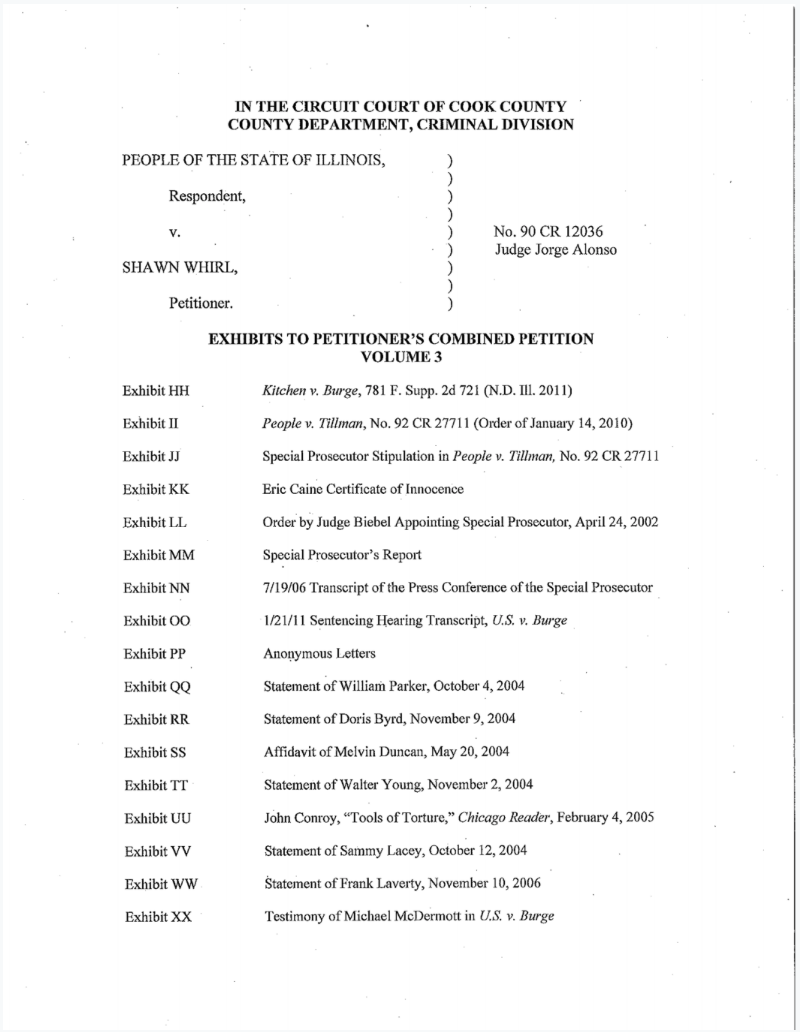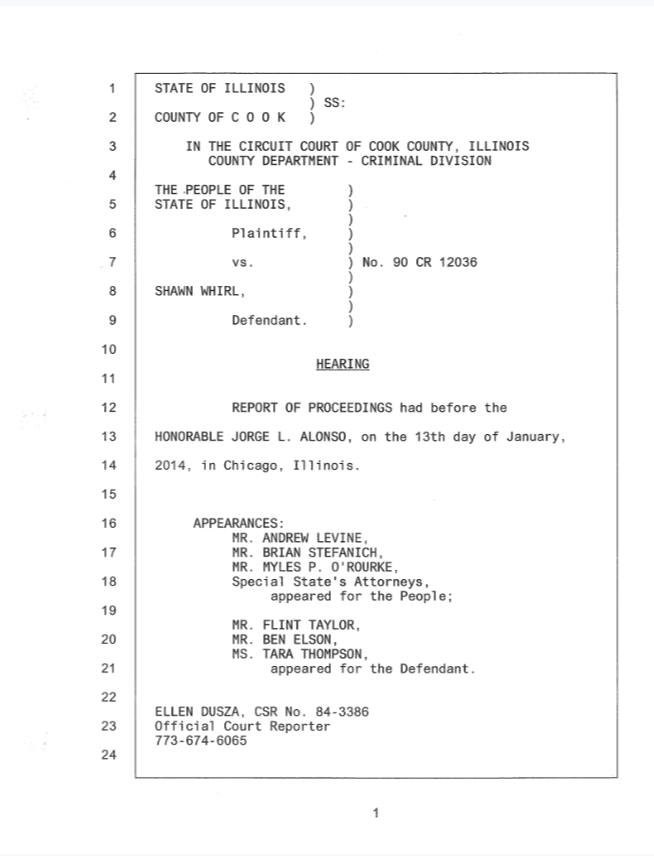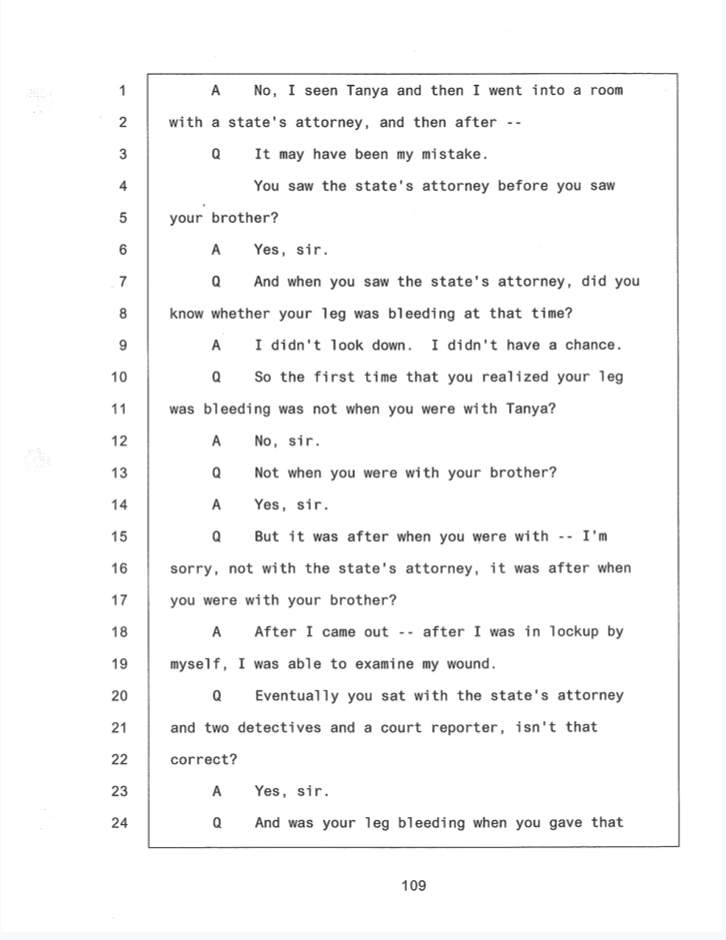


The following profile has been published with permission from The National Registry of Exonerations.
On April 18, 1990, 40-year-old Billy Williams was found shot to death in his taxicab on the South Side of Chicago. Two days later, police arrested 20-year-old Shawn Whirl after evidence technicians found Whirl’s fingerprints on the passenger door of the cab.
Detectives James Pienta and William Marley interrogated Whirl, a computer operator who had no prior convictions, and said that he confessed to murdering Williams. Whirl was charged with first-degree murder and attempted armed robbery.
During the summer of 1991, three days of hearings were held on Whirl’s motion to suppress his confession. Whirl testified that he was handcuffed to a wall in an interview room and was questioned by Detectives John Duffy and James Dwyer. Whirl denied involvement in the crime.
Whirl told the detectives that he was attacked by gang members while waiting on an L train platform. He said he was knocked off the platform and scraped his leg, but managed to get back up and onto a train that pulled into the station. The gang members boarded the train as well and chased him when he got off the train. Whirl said he took a cab to his girlfriend’s house to escape.
A tortured confession
After Whirl gave the detectives his statement, they left and Whirl testified that he fell asleep. He was awakened several hours later when Detective Pienta entered the room, stepped on his foot, and said, “Wake up, nigger.”
Whirl said that both of his hands were then handcuffed to the wall and that Pienta told him that his statement to the other detectives “won’t do.” According to Whirl, Pienta said that if he did not cooperate, the detectives would bring his girlfriend in for questioning.
Whirl testified that Pienta began telling him things to say in a statement admitting to the murder. When Whirl refused, Pienta slapped him repeatedly and continually scraped a metal key across a wound on Whirl’s leg that he had suffered during the fight two days earlier.
Eventually, Whirl began to repeat the statement given to him by Pienta, but kept failing to remember all of the details. Each time he made mistakes, Whirl said he was slapped and his wound was scraped. Ultimately, Whirl said he gave the statement that Pienta had dictated to him.
Whirl’s girlfriend testified that the police brought her to the station for questioning and that she heard Whirl screaming in pain.
Pienta testified and denied mistreating Whirl or threatening him in any way. He denied that Whirl was handcuffed to the wall.
Evidence was presented showing that a doctor at the Cook County Jail treated a wound on Whirl’s leg on April 25, 1990—five days after Whirl was charged with the crime.
Sentenced to 60 years in prison
On July 31, 1991, a Cook County Circuit Court judge denied the motion to suppress the confession. On October 7, 1991, during a court appearance, the prosecution said that it would seek the death penalty if Whirl went to trial and was convicted. Whirl agreed to plead guilty to first-degree murder and attempted armed robbery and was sentenced to 60 years in prison.
After the sentence was imposed, the defense lawyer told the judge that Whirl wanted to address the court. Whirl then said, “The thing I have to say is for the reason I’m taking this plea is for the simple fact that I didn’t do it.”
The judge asked, “You didn’t do it?”
Whirl repeated his denial and when the judge asked why he pled guilty, Whirl started to say he did so rather than face the death penalty, but the judge interrupted and said he would withdraw the plea and begin selecting a jury for a trial after a lunch recess.
After the recess, Whirl said he wanted the judge to reinstate his guilty plea. He said the reason he denied the crime was that he had never been to prison before and he was afraid of being locked up. The judge accepted the plea and again imposed a sentence of 60 years.
A series of post-conviction petitions
In 2008, Whirl filed a post-conviction petition seeking to vacate his plea claiming that he had not been informed at the time of the plea that he would face three years of mandatory supervised release. The petition was dismissed without a hearing as frivolous.
In 2011, Whirl tried to file another post-conviction petition claiming actual innocence. Attached to the petition were the records and affidavits from other defendants alleging a pattern of physical abuse of suspects during interrogation by Detective Pienta. Whirl also presented a statement from a witness who said that in April of 1990, he saw Whirl being chased by another man. The witness said that Whirl got into a cab and escaped. The same cab later returned and the man who was chasing Whirl got into the cab. The witness said in the statement that it was common knowledge in the neighborhood that the man who chased Whirl had killed the cab driver—who turned out to be Billy Williams—because Williams had helped Whirl get away.
In April 2011, the trial judge refused to allow Whirl to file the petition. The judge ruled that Whirl had failed to “consistently” claim over the years that he had been tortured into making a false confession.
By that time, allegations of torture involving scores of defendants had been made against Chicago Police Lt. Jon Burge and detectives under his command. In 2010, Burge was convicted in federal court of perjury for denying torture allegations during questioning in federal lawsuits brought by other torture victims. He was sentenced to 4½ years in prison.
Whirl appealed the decision dismissing his petition. In February 2012 attorneys from The Exoneration Project at the University of Chicago Law School and the People’s Law Office, filed another post-conviction petition on his behalf.
This petition was based in part on a finding by the Illinois Torture Inquiry and Relief Commission—which had been established to investigate claims of police torture—that Whirl had, indeed, been tortured. The Commission found “by a preponderance of the evidence, [that] there is sufficient evidence of torture to conclude that [Whirl’s] claim is credible and merits judicial review for appropriate relief.” The commission noted that Pienta was a “longtime Burge subordinate” and that Whirl had been repeatedly slapped and beaten by Pienta during the interrogation and that when Whirl screamed, Pienta put a potato chip bag over his mouth to muffle the screams.
The commission also agreed that Pienta had repeatedly gouged Whirl’s wound with a key and that Pienta had an extensive history of accusations of physical abuse.
Charges against Whirl are dismissed
In 2013 Whirl filed an amended post-conviction petition that included evidence on the pattern and practice of detectives under Burge’s command coercing false confessions by torture, a practice that continued after Burge moved on to other assignments.
In November 2013, the petition was dismissed. The judge agreed that there was evidence of torture by other detectives involving other defendants, but ruled that Whirl was not credible and therefore had not established that he was abused or tortured.
In August 2015, the Illinois Appellate Court reversed the dismissal. The appellate court vacated Whirl’s conviction and ordered that he be granted a new hearing on a motion to suppress his confession. The court noted that Pienta had repeatedly invoked his Fifth Amendment against self-incrimination when questioned about the interrogation.
“The new evidence presented at the post-conviction hearing, when weighed against the [prosecution’s] original evidence, was conclusive enough that the outcome of the suppression hearing likely would have been different if Pienta had been subject to impeachment based on evidence of abusive tactics he employed in the interrogation of other suspects,” the appellate court said. “Indeed, it is impossible to conceive of how the [prosecution] could prevail at a new suppression hearing with the officer alleged to have coerced a suspect’s confession invoking his privilege against self-incrimination.”
On October 13, 2015, the prosecution dismissed the charges and Whirl was released. Whirl filed a federal civil rights lawsuit that was settled by the city of Chicago for $4 million in January 2017.
– Written by Maurice Possley



